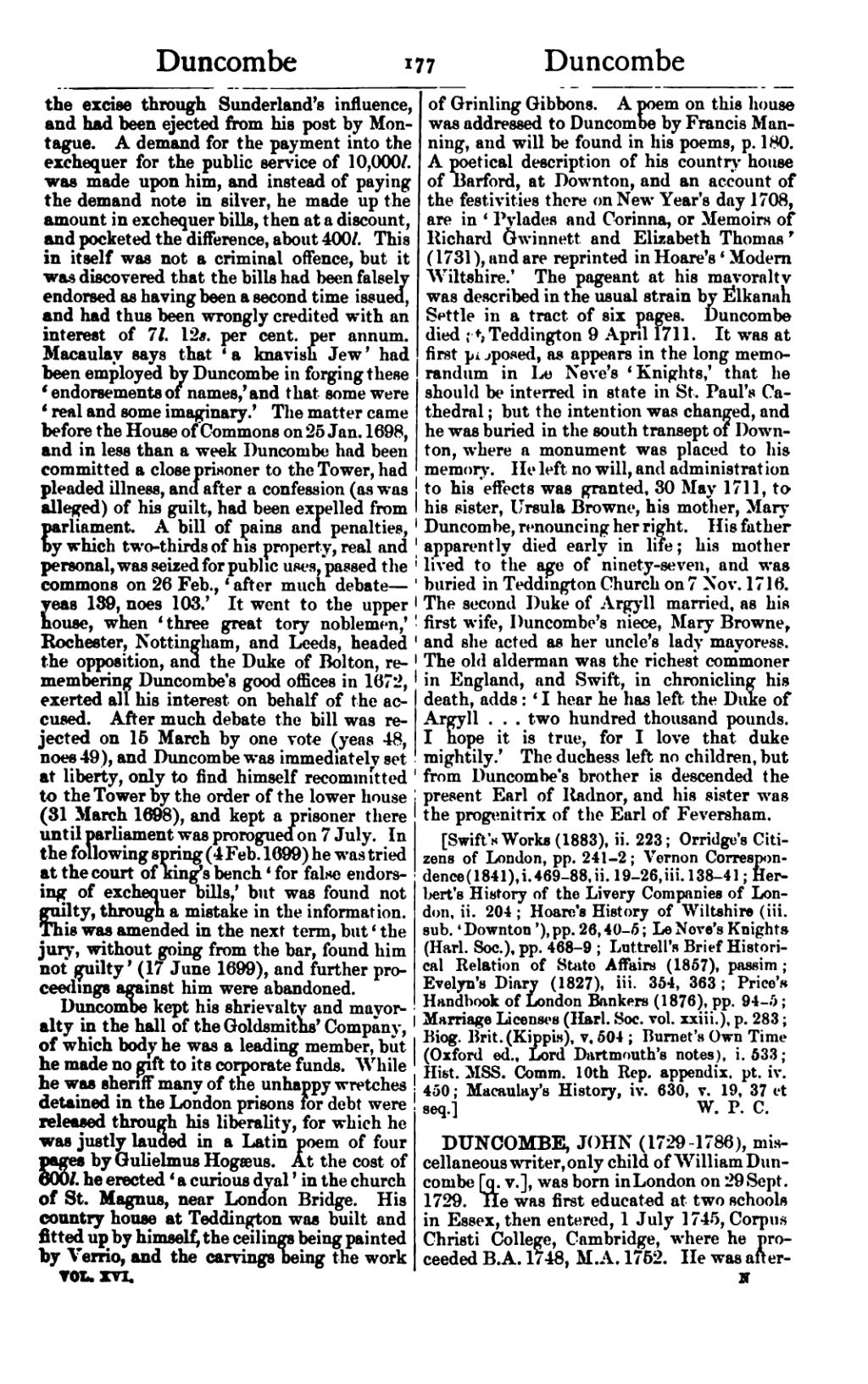the excise through Sunderland's influence, and had been ejected from his post by Montague. A demand for the payment into the exchequer for the public service of 10,000l. was made upon him, and instead of paying the demand note in silver, he made up the amount in exchequer bills, then at a discount, and pocketed the difference, about 400l. This in itself was not a criminal offence, but it was discovered that the bills had been falsely endorsed as having been a second time issued, and had thus been wrongly credited with an interest of 7l. 12s. per cent. per annum. Macaulay says that ‘a knavish Jew’ had been employed by Duncombe in forging these ‘endorsements of names,’ and that some were ‘real and some imaginary.’ The matter came before the House of Commons on 25 Jan. 1698, and in less than a week Duncombe had been committed a close prisoner to the Tower, had pleaded illness, and after a confession (as was alleged) of his guilt, had been expelled from parliament. A bill of pains and penalties, by which two-thirds of his property, real and personal, was seized for public uses, passed the commons on 26 Feb., ‘after much debate—yeas 139, noes 103.’ It went to the upper house, when ‘three great tory noblemen,’ Rochester, Nottingham, and Leeds, headed the opposition, and the Duke of Bolton, remembering Duncombe's good offices in 1672, exerted all his interest on behalf of the accused. After much debate the bill was rejected on 15 March by one vote (yeas 48, noes 49), and Duncombe was immediately set at liberty, only to find himself recommitted to the Tower by the order of the lower house (31 March 1698), and kept a prisoner there until parliament was prorogued on 7 July. In the following spring (4 Feb. 1699) he was tried at the court of king's bench ‘for false endorsing of exchequer bills,’ but was found not guilty, through a mistake in the information. This was amended in the next term, but ‘the jury, without going from the bar, found him not guilty’ (17 June 1699), and further proceedings against him were abandoned.
Duncombe kept his shrievalty and mayoralty in the hall of the Goldsmiths' Company, of which body he was a leading member, but he made no gift to its corporate funds. While he was sheriff many of the unhappy wretches detained in the London prisons for debt were released through his liberality, for which he was justly lauded in a Latin poem of four pages by Gulielmus Hogæus. At the cost of 600l. he erected ‘a curious dyal’ in the church of St. Magnus, near London Bridge. His country house at Teddington was built and fitted up by himself, the ceilings being painted by Verrio, and the carvings being the work of Grinling Gibbons. A poem on this house was addressed to Duncombe by Francis Manning, and will be found in his poems, p. 180. A poetical description of his country house of Barford, at Downton, and an account of the festivities there on New Year's day 1708, are in ‘Pylades and Corinna, or Memoirs of Richard Gwinnett and Elizabeth Thomas’ (1731), and are reprinted in Hoare's ‘Modern Wiltshire.’ The pageant at his mayoralty was described in the usual strain by Elkanah Settle in a tract of six pages. Duncombe died at Teddington 9 April 1711. It was at first proposed, as appears in the long memorandum in Le Neve's ‘Knights,’ that he should be interred in state in St. Paul's Cathedral; but the intention was changed, and he was buried in the south transept of Downton, where a monument was placed to his memory. He left no will, and administration to his effects was granted, 30 May 1711, to his sister, Ursula Browne, his mother, Mary Duncombe, renouncing her right. His father apparently died early in life; his mother lived to the age of ninety-seven, and was buried in Teddington Church on 7 Nov. 1716. The second Duke of Argyll married, as his first wife, Duncombe's niece, Mary Browne, and she acted as her uncle's lady mayoress. The old alderman was the richest commoner in England, and Swift, in chronicling his death, adds: ‘I hear he has left the Duke of Argyll … two hundred thousand pounds. I hope it is true, for I love that duke mightily.’ The duchess left no children, but from Duncombe's brother is descended the present Earl of Radnor, and his sister was the progenitrix of the Earl of Feversham.
[Swift's Works (1883), ii. 223; Orridge's Citizens of London, pp. 241–2; Vernon Correspondence (1841), i. 469–88, ii. 19–26, iii. 138–41; Herbert's History of the Livery Companies of London, ii. 204; Hoare's History of Wiltshire (iii. sub. ‘Downton’), pp. 26, 40–5; Le Neve's Knights (Harl. Soc.), pp. 468–9; Luttrell's Brief Historical Relation of State Affairs (1857), passim; Evelyn's Diary (1827), iii. 354, 363; Price's Handbook of London Bankers (1876) pp. 94–5; Marriage Licenses (Harl. Soc. vol. xxiii.), p. 283; Biog. Brit. (Kippis), v. 504; Burnet's Own Time (Oxford ed., Lord Dartmouth's notes), i. 533; Hist. MSS. Comm. 10th Rep. appendix, pt. iv. 450; Macaulay's History, iv. 630, v. 19, 37 et seq.]
DUNCOMBE, JOHN (1729–1786), miscellaneous writer, only child of William Duncombe [q. v.], was born in London on 29 Sept. 1729. He was first educated at two schools in Essex, then entered, 1 July 1745, Corpus Christi College, Cambridge, where he proceeded B.A. 1748, M.A. 1752. He was after-
